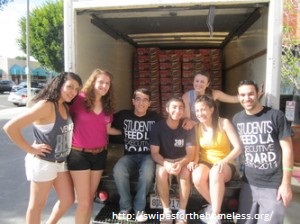College Students Employ New Strategies to Combat Hunger and Homelessness
April 25, 2012Amidst plentiful displays of delectable cuisine, college students with all-you-can eat meal plans are thinking about those who are hungry and homeless. In the United States, approximately 3.5 million people experience homelessness each year, with 671,859 people homeless on any given night, and 44.8 million people live in food insecure households, meaning they don’t always have access to enough food. In response, Thach “Tak” Nguyen and Bryan Pezeshki, students at the University of California, Los Angeles (UCLA) started the group “Swipes for the Homeless” which is now a nonprofit organization that allows students to donate unused dining hall meals, or “swipes”, to hungry and homeless people in Los Angeles. The group partners with the UCLA Dining Service and Office of Residential Life to provide food from the donated meal swipes to homeless shelters.
In addition to donating meals, the group aims to educate students about hunger and homelessness in the Los Angeles community. They also assist with the UCLA Food Closet which provides food for students experiencing hunger, as well as the Bruin Meal Voucher program to provide dining hall meals for financially-struggling students. However, it is difficult to estimate how many college students in the United States are experiencing poverty or hunger. The group has been recognized in a White House competition to honor students working on college campuses as a Champions of Change.
Although the program started at UCLA, Swipes for the Homeless now has chapters at the University of Southern California, University of California Irvine, University of California Berkeley, and University of Texas San Marcos and is looking to expand even further. Other universities have looked at similar ways to raise awareness of hunger in the community. The Yale Hunger and Homelessness Action Project leaders organize a fast twice each year where students can donate their meals for a day to raise awareness about hunger and homelessness. The project coordinators work with Yale Dining Services to donate proceeds to organizations that work with homeless populations. At Ohio State University, students can donate meal swipes to the Mid-Ohio Foodbank for groceries.
Some have questioned the effectiveness of donating meal swipes rather than cash or groceries to people who are homeless or hungry. With the program at Yale, for example, Yale Dining Services donates the cost of the food from the meal swipes—but not service costs. Thus, students are not passing on the full value of the meal swipe to help homeless individuals. However, others counter that many students are left with extra meals at the end of a semester which would be left unused otherwise, and it’s likely that students would be more willing to donate meal swipes than cash.
Although these programs don’t address the root causes of hunger and homelessness, they do provide needed resources, promote awareness of hunger and homelessness, and foster connections between students and their communities.
Comments are closed.
